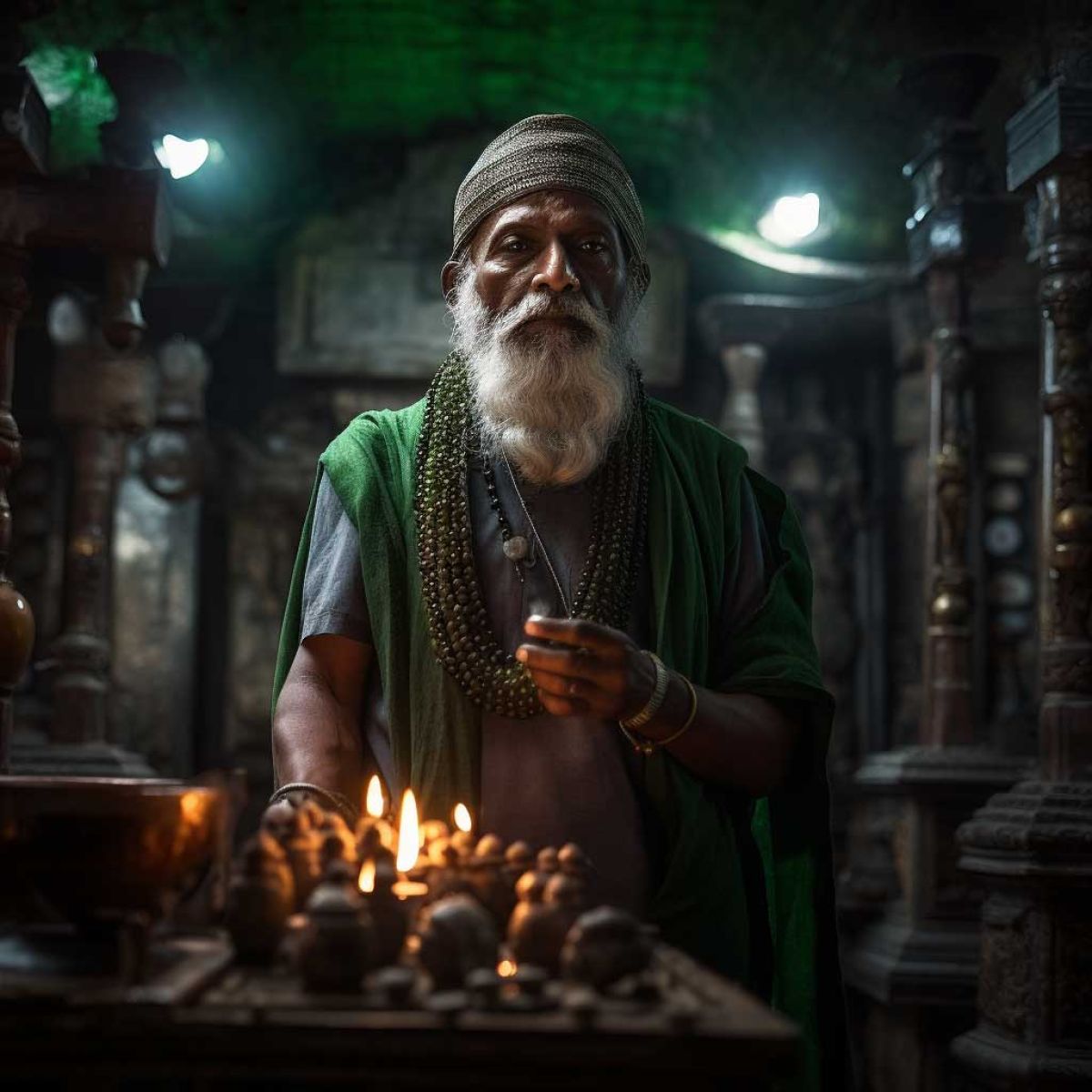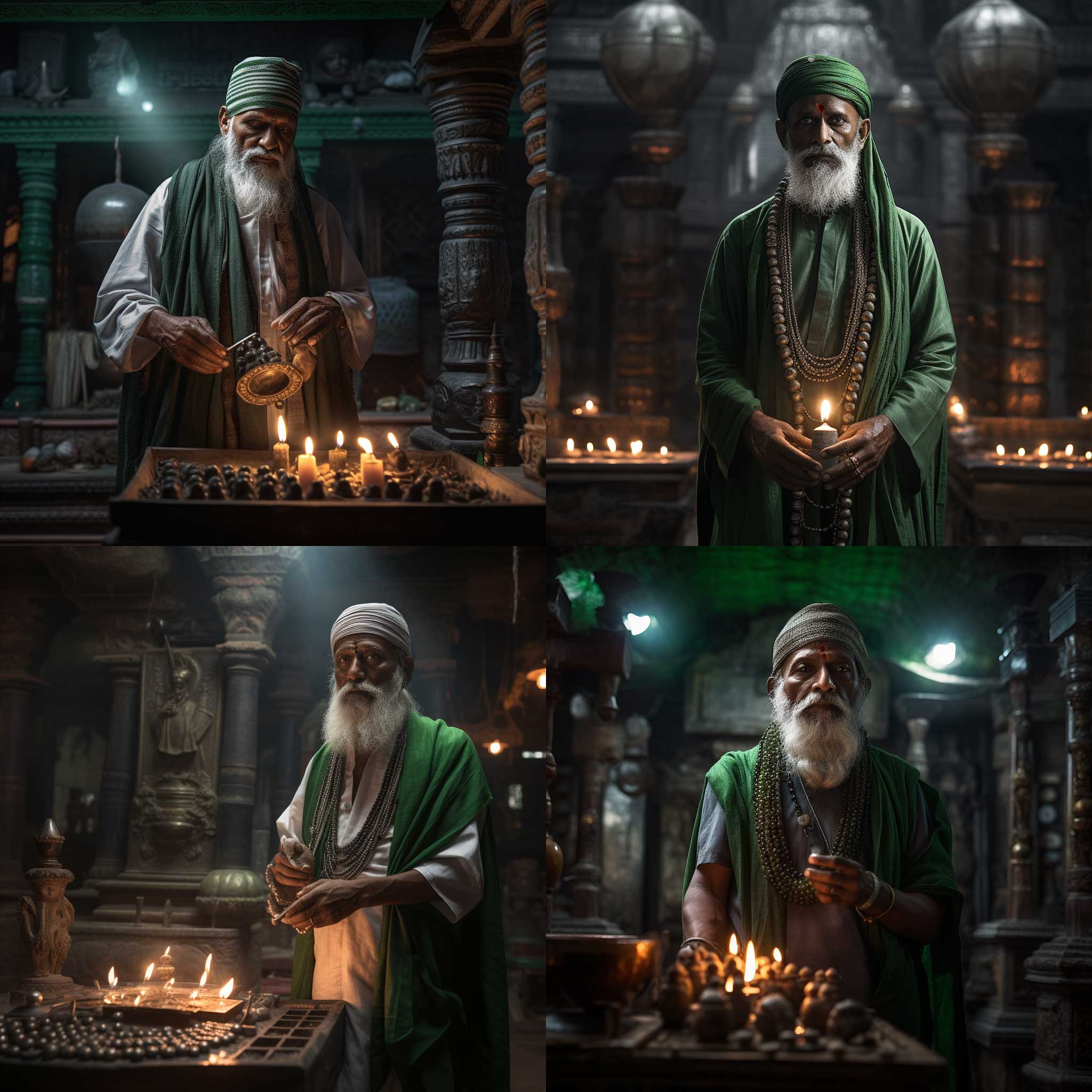More Coverage
Twitter Coverage
Satyaagrah
Written on
Satyaagrah
Written on
Satyaagrah
Written on
Satyaagrah
Written on
Satyaagrah
Written on
Join Satyaagrah Social Media
In the wake of the Madras HC's order banning non-Hindus from temple entry, Tirumala Tirupati Devasthanams' announcement to explore Muslims participation in Srivari Seva challenges traditional boundaries, igniting a complex debate on inclusivity & sanctity

In a move that has sparked widespread debate, the Tirumala Tirupati Devasthanams (TTD) announced on 2nd February its intention to consider the participation of Muslim "devotees" in Srivari Seva, the voluntary service to the deity at the revered Tirumala temple. This decision came to light following a request from Hussain Bhasha, a "Muslim devotee" from Naidupeta, during the TTD's monthly "dial your EO" program. TTD executive officer AV Dharma Reddy confirmed this development, stating that the organization acknowledges the existence of Muslim devotees of Bhagwan Venkateswara and is examining the feasibility of their request to partake in the voluntary services traditionally reserved for Hindu followers.
|
Reddy's press release further highlighted his "happiness" over the dedication shown by devotees from various faiths towards Bhagwan Venkateswara, noting that individuals from different religious backgrounds have made donations to the temple. This gesture by the TTD has ignited a firestorm of criticism, with many accusing the organization of using the temple, its resources, and its rich traditions as tools for monetary gain and political maneuvering. The inclusion of Muslims in Srivari Seva, a practice deeply ingrained in Hindu worship and devotion, has raised questions about the TTD's motives, suggesting an underlying agenda to secularize what many believe to be a sacred, religious service.
Critics argue that this decision undermines the sanctity of the temple's practices, viewing it as a departure from traditional norms under the guise of inclusivity. They claim that the TTD's actions are not just about fostering a spirit of unity among different faiths but are rather a calculated move to exploit the temple's resources and expand its revenue streams, all while playing into the hands of political agendas. The assurance given to Hussain Bhasha during the "dial your EO" program has become a focal point for those who see the TTD's openness to exploring Muslim participation in Srivari Seva as a blatant disregard for the temple's age-old traditions and beliefs.
This controversial decision by the TTD has opened up a Pandora's box of issues surrounding the commercialization of religious practices, the integrity of sacred services, and the potential for politicizing places of worship. It begs the question: Is the TTD prioritizing financial and political gains over the preservation of religious sanctity and tradition? As the debate rages on, it becomes increasingly clear that the Tirumala temple, a symbol of devout worship and spiritual sanctity, is at risk of being reduced to a mere tool in the hands of those looking to profit from its prestige and influence.
|
Srivari Seva: A Noble Service Marred by TTD's Motives
Srivari Seva, initiated in the year 2000, stands as a beacon of voluntary service within the Tirumala temple, aimed at enriching the pilgrimage experience for visitors from across India and beyond. Volunteers, known affectionately as Srivari Sevakulu, dedicate their time and efforts across a broad spectrum of activities – from vigilance and health services to the distribution of annaprasadam (sacred food) and laddu prasadam, and from maintaining the temple's gardens to assisting in medical facilities. Their work spans over 60 different areas of the Tirumala Tirupati Devasthanams (TTD), embodying the spirit of selfless service to the devotees of Sri Venkateswara, the presiding deity of the Tirupati temple.
Despite the noble intentions behind Srivari Seva and the genuine devotion of the Sevakulu, there's a growing concern over the TTD's handling of this service, particularly its inclination towards using the temple and its resources as a means for financial gain and political leverage. The Srivari Seva was conceived as a way to directly involve devotees in the temple's day-to-day operations, encouraging a personal connection to the divine through service. The Sevakulu themselves believe that their service "not only enlivens our spiritual life but also prepares our body and soul to act as per the will of the supreme Lord which is nothing but serving the fellow pilgrims with love and affection."
|
However, the sanctity of this belief is increasingly being overshadowed by the TTD's actions, which many see as a deviation from the original spiritual and communal goals of Srivari Seva. The inclusion of volunteers from various backgrounds, including potentially those from different faiths, while seemingly a step towards inclusivity, raises questions about the TTD's commitment to the temple's Hindu traditions. Critics argue that this move is less about fostering a spirit of universal brotherhood and more about the TTD's attempts to broaden its appeal and, by extension, its revenue sources, under the guise of inclusivity.
The essence of Srivari Seva, as described by the Sevakulu, is increasingly at risk of being diluted by the TTD's commercial and political motivations. The organization's role as the custodian of the Sri Venkateswara temple comes with the responsibility to uphold the temple's religious practices and traditions. Yet, the expansion of Srivari Seva into a tool for monetary gain and a platform for political influence suggests a departure from these responsibilities.
Srivari Sevaks, the dedicated volunteers of the Tirumala temple, come from various parts of India including Telangana, Tamil Nadu, Karnataka, Kerala, West Bengal, Maharashtra, Odisha, New Delhi, Chhattisgarh, Jharkhand, and not to forget, Andhra Pradesh. This diverse group even includes NRIs, who join in to fulfill their vows through devout service. On a regular day, at least 1000 Sevaks are present to serve, a number that significantly increases, tripling during festive and vacation seasons, showcasing the widespread commitment to serving the deity and the visiting pilgrims.
However, despite the noble intentions and the inclusive spirit demonstrated by these volunteers, the management practices of the Tirumala Tirupati Devasthanams (TTD) have come under scrutiny. The TTD's approach, as seen in the introduction of the Ashtadala Pada Padmaaradhana ritual in 1984 to honor a Muslim devotee's donation of 108 Gold Lotuses, reflects a complex interplay between inclusivity and the resistance it faces. This ritual, marking the Golden Jubilee Year of TTD, shows an acknowledgment of contributions from followers of different faiths. Yet, this gesture stands in contrast to the underlying resistance among some Hindu devotees towards the participation of non-Hindus in temple activities, a sentiment that the TTD's policies have inadvertently amplified.
This resistance is indicative of a broader issue within the TTD's management, where attempts at inclusivity often clash with traditionalist views, leading to a discord that overshadows the essence of volunteerism and devotion. The participation of Sevaks from diverse backgrounds, including those from other faiths, should ideally symbolize the unifying power of faith and service. Instead, it has become a point of contention, reflecting the TTD's failure to harmonize its administrative practices with the inclusive teachings at the heart of spirituality.
The TTD's handling of such matters not only fuels division but also detracts from the sanctity of the service offered by the Srivari Sevaks. The organization's responsibility extends beyond mere administrative oversight; it includes fostering an environment where devotion transcends man-made boundaries of religion and nationality.
Recently, Madras High Court Upholds Sanctity of Hindu Temples with Entry Ban for Non-Hindus
In a recent ruling that has garnered widespread support, the Madras High Court has taken a firm stance by banning the entry of non-Hindus into temples across Tamil Nadu. This decisive action comes in the wake of a petition challenging the presence of individuals from other faiths within the sacred confines of Hindu temples.
The Madurai Bench of the Madras High Court, addressing the concerns surrounding the Palani Murugan Temple, issued a landmark judgment. It clarified that non-Hindus and individuals not adhering to Hindu beliefs are specifically barred from proceeding beyond the temple's 'kodimaram' (flagstaff), a symbol of divine presence and sanctity. Furthermore, the court emphasized the importance of visibly displaying notices throughout the temple premises to inform visitors of this restriction, ensuring clarity and respect for the temple's spiritual ambiance.
The backdrop to this judicial decision involved a dispute where a Muslim family, after being denied entry, argued with temple employees. The family, unaware of any explicit prohibitions, expressed their intent to visit the sacred Hill for taking photographs, inadvertently treating a place of profound religious significance as though it were a mere tourist attraction or "picnic spot." This incident highlights the delicate balance between respecting religious sanctuaries and the inclusivity of public spaces.
The court's judgment underscores a crucial principle: the need to preserve the sanctity and spiritual integrity of Hindu temples. By restricting access to those who do not share the temple's religious beliefs, the ruling not only honors the devout practices and traditions of Hinduism but also safeguards these sacred spaces from becoming secular tourist sites devoid of their spiritual essence.
This decision has been met with approval from many who see it as a necessary measure to protect the spiritual and cultural heritage of Hindu temples. It reinforces the idea that religious sites are not merely historical or architectural landmarks but are, first and foremost, places of worship, deserving of reverence and respect according to their faith's traditions.
By mandating clear communication of these guidelines through notices, the judgment also aims to prevent misunderstandings and ensure that all visitors, regardless of their background, are aware of and respectful towards the religious practices and beliefs that define these sacred spaces. In doing so, it fosters an environment of mutual respect and understanding, preserving the temples as sanctuaries of Hindu faith and devotion.
Upholding the Sanctity of Srivari Seva in the Shadow of Judicial Decisions
The critical examination of the Tirumala Tirupati Devasthanams (TTD)'s management of Srivari Seva highlights deeper issues concerning the commercialization of religious practices and the exploitation of volunteerism for financial and political ends. This scrutiny is further complicated by recent judicial decisions, such as the Madras High Court's ruling to ban non-Hindus from entering Hindu temples across Tamil Nadu, underscoring the delicate balance between religious sanctity and inclusivity.
The essence of Srivari Seva is to serve the devotees of Sri Venkateswara with heartfelt devotion, embodying the values of love, affection, and unwavering dedication. This service, rooted in the profound spiritual tradition of the Tirumala temple, is designed to enrich the pilgrim experience, maintaining a direct connection to the divine. The inclusion of court orders restricting temple access to non-Hindus introduces a new dimension to the conversation about preserving the purity of religious practices and the spaces in which they are observed.
|
In light of these developments, it becomes even more crucial to focus on protecting the integrity of Srivari Seva. The challenge lies in ensuring that this volunteer service continues to reflect its foundational purpose, untouched by external influences and internal mismanagement, while respecting the legal frameworks set by judicial authorities. The debate over the TTD's practices and the broader implications of court rulings on religious inclusivity and sanctity invites a reevaluation of how we approach the preservation of sacred traditions in a changing societal landscape.
Moving forward, it is essential that the commitment to serving the devotees of Sri Venkateswara remains paramount, guided by principles of selflessness and spiritual devotion. The recent court order serves as a reminder of the need to safeguard the spiritual heritage of Hindu temples, ensuring that volunteer services like Srivari Seva continue to thrive as expressions of pure devotion, free from commercial exploitation and aligned with the legal and ethical considerations that shape religious practice today.
 |
 Support Us
Support Us
Satyagraha was born from the heart of our land, with an undying aim to unveil the true essence of Bharat. It seeks to illuminate the hidden tales of our valiant freedom fighters and the rich chronicles that haven't yet sung their complete melody in the mainstream.
While platforms like NDTV and 'The Wire' effortlessly garner funds under the banner of safeguarding democracy, we at Satyagraha walk a different path. Our strength and resonance come from you. In this journey to weave a stronger Bharat, every little contribution amplifies our voice. Let's come together, contribute as you can, and champion the true spirit of our nation.
 |  |  |
| ICICI Bank of Satyaagrah | Razorpay Bank of Satyaagrah | PayPal Bank of Satyaagrah - For International Payments |
If all above doesn't work, then try the LINK below:
Please share the article on other platforms
DISCLAIMER: The author is solely responsible for the views expressed in this article. The author carries the responsibility for citing and/or licensing of images utilized within the text. The website also frequently uses non-commercial images for representational purposes only in line with the article. We are not responsible for the authenticity of such images. If some images have a copyright issue, we request the person/entity to contact us at This email address is being protected from spambots. You need JavaScript enabled to view it. and we will take the necessary actions to resolve the issue.
Related Articles
- "तिरुपति प्रसादम": TTD blacklisted the supplier after confirming the desecration of Prasadam with beef fat and pig fat adulteration, as Chandrababu Naidu earlier exposed this shocking betrayal, while Jagan Reddy continues to reject the accusations
- DMK Govt’s move to take over the Ayodhya mandapam using Tamil Nadu HRCE department failed utterly after Madras HC set aside the order: Dravidianists had a meltdown over a win for Hindus
- "Festivals are like a map charting our spiritual progress in God": India is a land of temples and unique rituals, one such followed by devotees in a Karnataka Temple is Agni Keli, symbolizing the victory of good over evil integral to our cultural heritage
- A new symbol of Hindutva pride, Shri Kashi Vishwanath Temple Corridor
- 'There is a lot more seen inside than imagined, it is beyond the imagination of not only me but all', says Gyanvapi petitioner after coming out of the survey at the disputed structure
- Swami Darshan Bharti, a veteran saint working against illegal mushrooming Mazars highlights rapid demographic change on Devbhoomi Uttarakhand, points out that 'Muslim population used to be 1.5% now it is 14%’
- PM to unveil the 'Statue of Equality' of 11th century Vaishnavite saint Ramanujacharya: World’s second-largest statue in sitting position in Hyderabad on the 40-acre sprawling premises
- "Sometimes it's more about the journey than the destination": Prepare to embark on a transcendent journey of a family to the revered 18 Maha Shakti Peeths with the upcoming streaming series, 'Sarvam Shakthi Mayam' filled with emotive and spiritual depth
- "चलाक मंदबुद्धि": Muslim man Sher Khan pelts stones at Ram Temple, threatens Mahant, claiming the temple belongs to Muslims; Mahant Arun Chaudhary asserts Sher Khan is faking mental instability, only targeting Hindus and making a fool out of everyone
- "Pure devotion is a vessel for divine grace": Envision a monumental statue of Lord Ram, reaching skywards to a staggering 108 feet! This grand spectacle, representing millennia-old Vaishnava tradition will grace Andhra Pradesh's Kurnool district
- Ashok Gehlot-Led Congress Govt in Rajasthan unleashed bulldozer to demolish 300-year-old Hindu temple in Alwar, houses of 85 Hindu families to ‘widen road’ citing masterplan: Over hundred families homeless in Rajgarh
- Construction of Ram Mandir in Ayodhya is in full flow with the foundation work finished, main contractor for construction is Larsen & Toubro while Tata Consulting Engineers are project management consultant
- "राम लल्ला विराजमान": Amidst fervent devotion, Ayodhya's Ram Mandir stands tall, facing controversies head-on, as PM Modi graces the Pran Pratishtha, the temple, with Ram Lalla's idol by Arun Yogiraj, symbolizes a historic confluence of faith and dispute
- "Our greatest glory is not in never falling, but in rising every time we fall": UNESCO world heritage site, Mamallapuram Temple of Tamil Nadu becomes India's most visited monument by foreigners, surpassing Taj Mahal as per Indian Tourism Statistics 2022
- "You don't have a soul. You are a Soul. You have a body": Anything lost, any work to be done, or any issue to be solved; first and foremost, people recall this divine 'Koragajja', one of the most sacred, worshipped, and sought-after spirits in Tulunadu
























